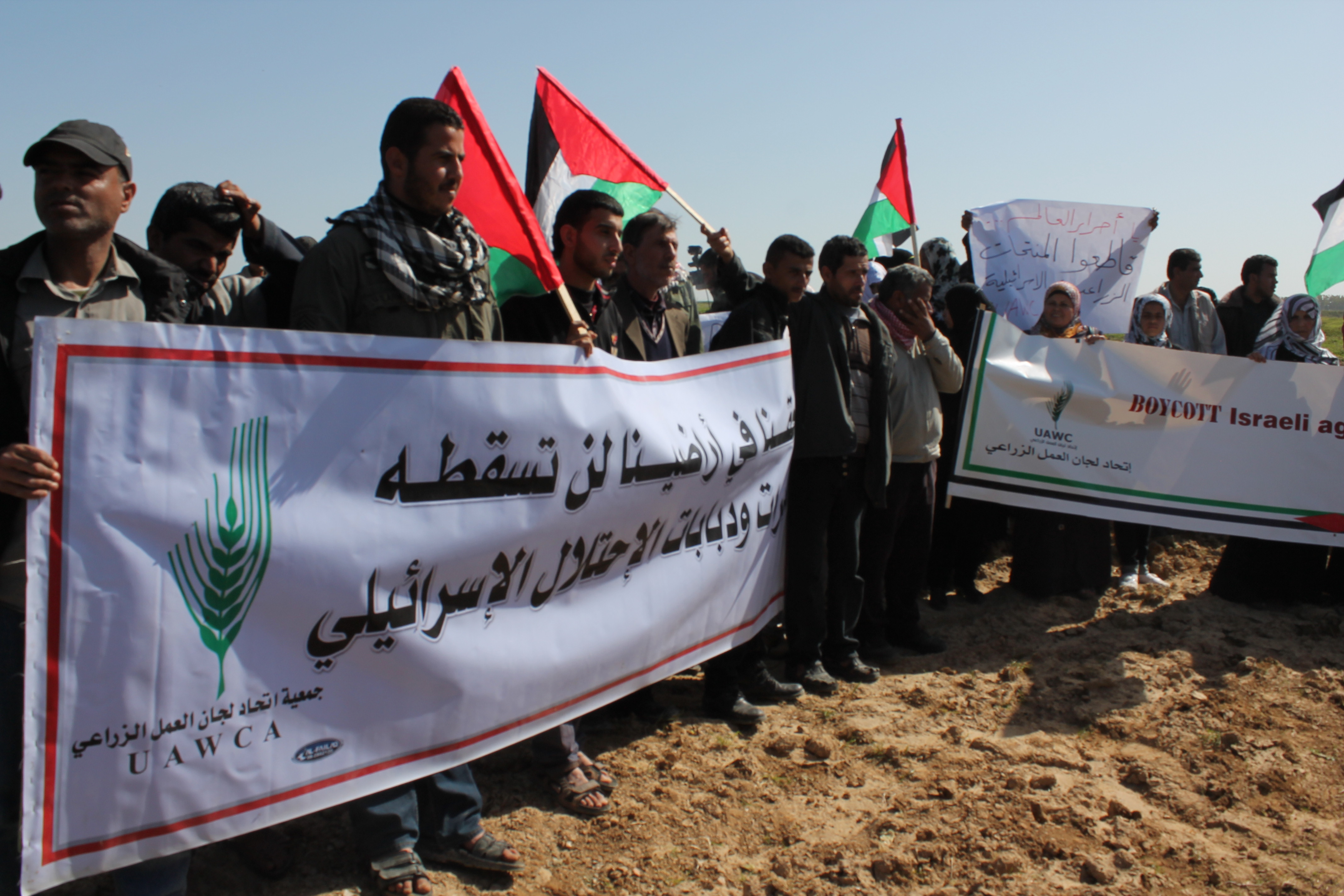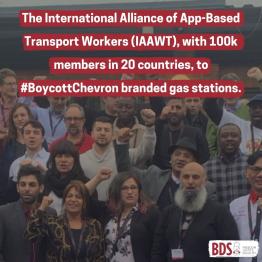Trade union solidarity
Overview
Palestinian workers often bear the brunt of Israel’s efforts to undermine the Palestinian economy and its regime of settler colonialism and apartheid.
Palestinian trade unions have always played a key role in the Palestinian struggle for freedom, justice and equality.
In 2011, Palestinian trade unions came together to issue an appeal for international trade unions to join the BDS movement and form the Palestinian Trade Union Coalition for BDS (PTUC-BDS).
Scores of trade unions and trade union federations across the world have endorsed BDS as a key form of solidarity with Palestinian workers. Trade unions are making a vital contribution to the BDS movement through campaigns. Dockworkers in the US, South Africa, Sweden and elsewhere have refused to unload Israeli ships and exports.
Background
Israel’s systematic destruction of the Palestinian economy, its discriminatory and racist laws and its restrictions on freedom of movement and association have a huge impact on the rights and working conditions of Palestinian workers. Palestinian trade unions have long been at the heart of the Palestinian struggle for freedom, justice and equality.
In 2011, Palestinian trade unions came together to issue an appeal for international trade unions to join the BDS movement and form the Palestinian Trade Union Coalition for BDS (PTUC-BDS). Palestinian unions are urging trade unions across the world to launch effective boycott campaigns and to boycott the Histadrut, the Israeli trade union that played a key role Israel’s early colonisation of Palestine and continues to play a vital role in Israel’s oppression of Palestinians
Since 1948, Israel has systematically confiscated Palestinian land and natural resources. As part of its regime of settler colonialism and apartheid, Israel has implemented a range of measures aimed at undermining Palestinian economic activity and development. These measures include:
-
In Gaza, Israel has imposed a siege that severely limits the entry of materials and inputs for manufacturing and the export of goods.
-
In the West Bank, Israel has implemented restrictions on movement, land access, water access and a range of obstacles to ensure exports are kept to a minimum.
-
Across the occupied Palestinian territories, Israel deliberately undermines Palestinian agricultural production.
-
Under the terms of the Paris Protocol, Israel has the final say on what Palestinians can import and export and control over many aspects of Palestinian economy activity.
Together, these measures have created a situation where the Palestinian economy is largely dependent on foreign aid and investment and on imported goods. This has a significant impact on employment and pay levels.
Israel’s economic siege of Gaza has led to unemployment reaching 60% - the highest rate in the world - low levels of pay and poor conditions. For example, construction workers say that on the rare occasion when they are able find work, they are paid as little as 30 shekels (just under $8) for a hard day of physical labour.
Israel’s strategy for the West Bank is to create economic dependency and exploitation. Palestinians able to find work in the in the West Bank are being left stranded in a dependent economy and face long and humiliating waits at checkpoints and complete control of their life and work by the Israeli military.
Loss of income sources and high unemployment leaves many Palestinians in the West Bank with no option but to work in illegal Israeli settlements where pay is below the minimum wage and conditions are exploitative and often dangerous.
As many as 1,000 Palestinian children are employed in Israeli settlements at any one time, often paid as little as $18 per day to work in dangerous and exploitative conditions.
Israel regularly withholds payments of tax it collects on behalf of the Palestinian Authority, meaning that public sector employees are often left without their salary being paid for months on end.

Palestinian citizens of Israel face systematic discrimination in the labour market. Many jobs are only open to people who have served in the military, excluding Palestinians from many jobs. Only 6.6% of Israeli state employees are Palestinian. Communications giant Bezeq employs less than a dozen Palestinians out of a total workforce of 10,000.
More than 30,000 Palestinians from the West Bank legally enter Israel each day to work while thousands more make the journey without official permission because as only a small percentage of permit requests are approved. Those who do have permissions have a gruelling work life as they must start queuing to get through an intricate set of Israeli checkpoints at around 2am.
Palestinian workers in Israel often face routine racism in the workplace. In 2004, Palestinian workers’ on a construction site near in the Israeli parliament were forced to wear helmets marked with a red X in order to facilitate their assassination by security forces in the case of emergency.
In photos: Palestinian workers’ everyday nightmare at Israeli checkpoints

Palestinian trade unions have long been at the heart of the Palestinian struggle for freedom, justice and equality.
Palestinian labour unions played a vital role in the Great Revolt of 1936 against British rule and Zionist colonisation. Palestinian workers launched a general strike that lasted 6 months, one of the longest strikes anywhere in the world. Palestinian unions led strikes and boycotts of Israeli products throughout the first intifada.
More recently, Palestinian unions have campaigned against falling pay levels and other attacks on conditions in the Palestinian public sector.
All of the major Palestinian trade unions were signatories to the 2005 call for BDS and are members of the Palestinian BDS National Committee.
In 2011, Palestinian trade unions came together to issue an appeal for international trade unions to join the BDS movement and form the Palestinian Trade Union Coalition for BDS (PTUC-BDS).

The Histadrut is Israel’s trade union federation. The Histadrut was played a key role Israel’s early colonisation of Palestine and continues to play a vital role in Israel’s oppression of Palestinians. It does this by:
-
Publicly supporting Israel’s attacks on Gaza and other war crimes.
-
Maintaining active commercial interests in Israel’s illegal settlements.
-
Allowing Jewish Israeli settlers in the occupied West Bank to join the organisation.
-
Illegally withholding over NIS 8.3 billion (approximately $2bn) from wages earned by Palestinian workers from the Occupied Palestinian Territory. This money was deducted by the Israeli state and transferred to the Histadrut for ‘social and other trade union benefits’ that Palestinian workers have never received.
In its founding statement, the Palestinian Trade Union Coalition for BDS (PTUC-BDS) called on international trade unions to sever all ties with the Histadrut. A large number of trade unions have done exactly that.
Impact
Building solidarity with Palestinian workers
All of the major Palestinian trade unions were signatories to the 2005 call for BDS and are members of the Palestinian BDS National Committee. In 2011, Palestinian trade unions came together to form the Palestinian Trade Union Coalition for BDS (PTUC-BDS) and to issue an appeal for international trade unions to join the BDS movement.

Milestones

Trade unions across the world back BDS
Trade unions and national trade union federations across the world have voted to endorse BDS or BDS initiatives. This includes: COSATU in South Africa, CUT in Brazil, the Irish Congress of Trade Unions, the UK Trade Union Congress, Belgian federation ABVV/FGTB, French unions CNT and CGT Educ'Action, the LO federation in Norway, the Canadian Postal Workers Union, among many others. Dozens of unions and federations across the Arab World support the BDS movement including the Federation of Independent Trade Unions of Jordan (FITU-J), the Egyptian Medical Syndicate, Moroccan Workers Union (UMT), amongst others. The Public Services International and several other international federations have also adopted BDS.

Unions are leading effective BDS campaigns
Trade unions across the world are leading effective BDS campaigns. For example, Norwegian union Fagforbundet is at the forefront of effective campaigns against G4S and SodaStream, major unions in the UK are pressuring G4S over its role in Israel’s prisons and the French farmers union mobilised thousands of people to support a successful campaign against the construction of a port in the south of France that would have been used to import Israeli fruit and vegetables. In Brazil, the trade union federations, such as CUT, CTB and CSP-Conlutas play a key role in the campaign for a military embargo and helped to lead the succesful campaign that led to the state of Rio Grande do Sul cancelling a major collaboration deal with Israeli military company Elbit Systems.

Dockworkers blockade Israeli goods and ships
Dockworkers in Durban responded to Israel’s 2008-09 attack on Gaza by refusing to unload Israeli products. In 2010, the the Swedish Dockworkers’ Union blockaded more than 500 tons of goods to and from Israel in protest at its attack on a humanitarian flotilla headed for Gaza and to call for an end to the blockade on Gaza. In the US, dockworkers have repeatedly respected community and labour picket lines and refused to unload Israeli ships.
Take Action
The BDS movement is the most effective way that trade unions and union members across the world can take action in solidarity with Palestinian workers and the Palestinian struggle for freedom, justice and equality. Here are some ideas about how to get involved with organising around BDS in your union today.



